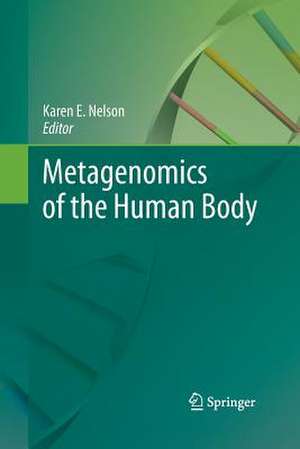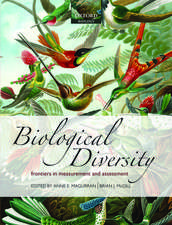Metagenomics of the Human Body
Editat de Karen E. Nelsonen Limba Engleză Paperback – 19 sep 2014
| Toate formatele și edițiile | Preț | Express |
|---|---|---|
| Paperback (1) | 700.61 lei 6-8 săpt. | |
| Springer – 19 sep 2014 | 700.61 lei 6-8 săpt. | |
| Hardback (1) | 952.89 lei 6-8 săpt. | |
| Springer – 17 noi 2010 | 952.89 lei 6-8 săpt. |
Preț: 700.61 lei
Preț vechi: 824.25 lei
-15% Nou
Puncte Express: 1051
Preț estimativ în valută:
134.06€ • 140.72$ • 111.27£
134.06€ • 140.72$ • 111.27£
Carte tipărită la comandă
Livrare economică 10-24 aprilie
Preluare comenzi: 021 569.72.76
Specificații
ISBN-13: 9781489982407
ISBN-10: 148998240X
Pagini: 372
Ilustrații: XVII, 351 p.
Dimensiuni: 155 x 235 x 20 mm
Greutate: 0.52 kg
Ediția:2011
Editura: Springer
Colecția Springer
Locul publicării:New York, NY, United States
ISBN-10: 148998240X
Pagini: 372
Ilustrații: XVII, 351 p.
Dimensiuni: 155 x 235 x 20 mm
Greutate: 0.52 kg
Ediția:2011
Editura: Springer
Colecția Springer
Locul publicării:New York, NY, United States
Public țintă
Professional/practitionerCuprins
Preface: The Human Genome and the Human Microbiome.- Chapter 1: The Human Genome, Microbiome and Disease.- Chapter 2: Host Genotype and the effect on Microbial Communities.- Chapter 3: The Human Microbiome and Host-Pathogen Interactions.- Chapter 4: The Human Virome.- Chapter 5: Selection and Sequencing of Strains as References for Human Microbiome studies.- Chapter 6: The Human Vaginal Microbiome.- Chapter 7: The Human Lung Microbiome.- Chapter 8: The Human Skin Microbiome in Health and Skin Diseases.- Chapter 9: The Human Oral metagenome.- Chapter 10: Infectogenomics: aspect of Host Responses to Microbes in the Digestive Tract.- Chapter 11: Autoimmune Disease and the Human Metagenome.- Chapter 12: Metagenomic applications and the potential for understanding chronic liver disease.- Chapter 13: Symbiotic gut microbiota and the modulation of human metabolic phenotypes.- Chapter 14: MetaHIT: The European Union Project on Metagenomics of the Human Intestinal Tract.- Chapter 15: Implications of Human Microbiome Research for the Developing World.
Textul de pe ultima copertă
Metagenomics of the Human Body introduces readers to the major findings from the human genome project and at the same time presents the crossover to the human metagenome/microbiome, which we are only starting to understand through the advent of newly emerging technologies and other developments. The book brings a new perspective by combining the information gained from the human genome with that derived from parallel metagenomic studies, and new results from investigating the effects of these microbes on the host immune system. As the field of metagenomics continues to evolve, Metagenomics of the Human Body brings together leaders in the field and their unique perspectives on this topic. The authors focus on the human genome and recent developments in the fields of microbial ecology and metagenomics of the microbial species that are associated with the human body. They also discuss the enormous implications for health and disease.Metagenomics of the Human Body is ideal for scientists, clinicians, community activists, undergraduate and graduate level students, as well as ethical and legal groups associated with or interested in the issues surrounding the human genome. About the EditorDr. Karen E. Nelson is the Director of the Rockville Campus of the J. Craig Venter Institute (JCVI) where she has been for the past 14 years. She was formerly the Director of Human Microbiology and Metagenomics in the Department of Human Genomic Medicine at the JCVI. She has authored or co-authored over 100 publications, and is currently Editor-in-Chief of the Springer journal Microbial Ecology. She is also a standing member of the NRC Committee on Biodefense, a member of the American Society for Microbiology (ASM) Communications Committee and a Fellow of the ASM.
Caracteristici
Introduces readers to the major findings from the human genome project. The book brings a new perspective by combining the information gained from the human genome with that derived from parallel metagenomic studies. Brings together leaders in the field and their unique perspectives on this topic. Includes supplementary material: sn.pub/extras










